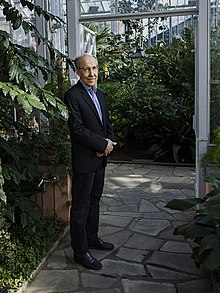Kari Alitalo
Kari Kustaa Alitalo (born May 21, 1952 in Kuopio ) is a Finnish molecular biologist and cancer researcher. He is best known for his work on angiogenesis and its growth factors .
Life
Alitalo obtained his MD from the University of Helsinki in 1977 as a medical degree and in 1980 from Antti Vaheri an M.Sc.D. (comparable to a Ph.D. ) with a thesis on tumor biology. As a postdoctoral fellow , he worked in San Francisco with the later Nobel Prize winners John Michael Bishop and Harold Elliot Varmus . Alitalo received a professorship at the University of Turku in 1986, a research professorship at the Finnish Cancer Institute in 1987 and a professorship at the University of Helsinki in 1988.
Alitalo has been Professor at the Academy of Finland since 1993, and since 1999 Head of the Research Program in Molecular Cancer Biology at the University of Helsinki .
From 2001 to 2011 he was director of the Center of Excellence in Cancer Biology of the Finnish Academy of Sciences . Since 2013 he has also been head of the Wihuri Research Institute .
Act
Alitalo and colleagues are investigating vascular (vessel-related) growth factors, particularly with a view to the development of therapeutic options for cancer and cardiovascular diseases , but also for other diseases such as diabetes mellitus , psoriasis or rheumatism , and for physiological conditions such as wound healing or menstruation or during embryogenesis .
The main goal of Alitalos research is to elucidate the mechanisms of cancer and the development of drugs that exploit the dependence of tumor tissue on the surrounding healthy tissue. His investigations into the mechanisms of cancer development and growth at the molecular level have led to numerous new insights into vascular growth factors. Alitalo and co-workers identified three of five known vascular growth factors ( VEGF -C, VEGF-B, Ang -1), plus the VEGF receptors VEGFR-3 and Tie-1 and the tyrosine kinase Bmx. Alitalo was able to demonstrate the importance of factors and their receptors in cancer metastasis . Using studies on transgenic mice, Alitalo and colleagues were able to show that VEGFR-3 in dissolved form can reduce the formation of lymphatic vessels and thus the spread of metastatic tumors. In addition to the treatment of cancer, other possible applications of this knowledge are in the treatment of functional disorders of the lymphatic system or of cardiovascular diseases.
Alitalo has published more than 550 scientific publications , including more than 120 systematic reviews , some in renowned journals such as Nature or Nature Medicine . His work has been cited over 55,000 times (as of 2014). It has an h-index of 125 (as of 2013). From 1996 to 2007 he was the second most cited European author in the field of cell biology . He holds 46 patents. Alitalo is one of the editors of several scientific journals such as EMBO Molecular Medicine or the Journal of Clinical Investigation . He worked as a peer reviewer for Nature , Cell or Science .
Awards (selection)
- 1990 Member of the European Molecular Biology Organization (EMBO)
- 1991 member of the Finnish Academy of Sciences
- 2003 Léopold Griffuel Prize
- 2005 Eric K. Fernström priser
- 2006 Louis Jeantet Prize
- 2009 InBev-Baillet Latour Health Prize
- 2012 member of the Academia Europaea
- 2012 member of the Royal Swedish Academy of Sciences
- 2013 member of the National Academy of Sciences
- 2013 Finnish Science Award
- 2014 AH Heineken Prize for Medicine
- 2015 Jacob Henle Medal
- 2019 International Antonio Feltrinelli Prize
Web links
- Alitalo Lab and curriculum vitae (PDF, 527 kB, status approx. 2013) at the University of Helsinki (helsinki.fi)
- Kari Alitalo at the Academy of Finland (aka.fi)
Individual evidence
- ↑ Lauréats du Prix Fondation ARC Léopold Griffuel at the Fondation ARC (fondation-arc.org); accessed on April 22, 2019.
- ^ Eric K. Fernström priser 2005 at Lund University (lu.se); Retrieved April 15, 2014
- ^ Fondation Louis-Jeantet - Lauréats. In: jeantet.ch. Retrieved February 11, 2016 (French).
- ^ Kari Alitalo at the Academia Europaea (ae-info.org); Retrieved April 17, 2014
- ^ Kari Alitalo at the National Academy of Sciences (nasonline.org); Retrieved April 15, 2014
- ↑ Finnish Science Prize to Academy Professor Kari Alitalo ( Memento from May 26, 2014 in the Internet Archive ) at the Finnish Ministry of Education and Culture (minedu.fi).
- ^ Kari K. Alitalo at the Royal Dutch Academy of Sciences (knaw.nl); Retrieved April 15, 2014
| personal data | |
|---|---|
| SURNAME | Alitalo, Kari |
| ALTERNATIVE NAMES | Alitalo, Kari K .; Alitalo, Kari Kustaa (full name) |
| BRIEF DESCRIPTION | Finnish molecular biologist and cancer researcher |
| DATE OF BIRTH | May 21, 1952 |
| PLACE OF BIRTH | Kuopio |
